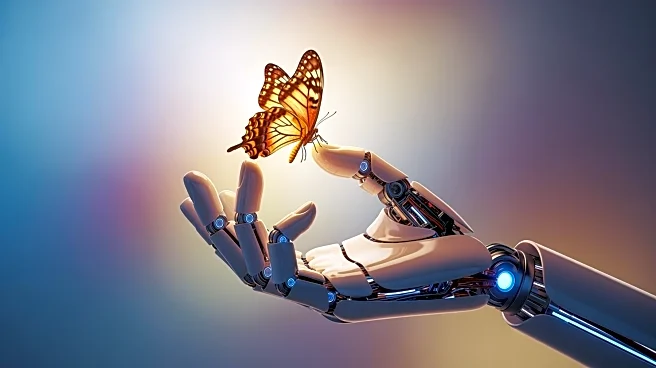What's Happening?
Jessica Smith, a former Australian Paralympic swimmer, recently experienced a breakthrough in AI image generation technology. Smith, who is missing her left arm below the elbow, initially struggled to
create an accurate AI-generated image of herself using ChatGPT. The AI system repeatedly produced images of women with two arms or with prosthetic devices, highlighting a lack of data and representation for individuals with disabilities. However, after recent updates to the AI model, Smith successfully generated an accurate image reflecting her physical appearance. This development marks a significant step forward in AI's ability to represent diverse individuals, including those with disabilities. OpenAI, the company behind ChatGPT, has acknowledged the improvements and is committed to further refining its models to reduce bias and enhance fair representation.
Why It's Important?
The advancement in AI image generation technology is crucial for millions of people with disabilities who seek accurate representation in digital spaces. This progress underscores the importance of inclusivity in technology, ensuring that AI systems evolve to reflect the diversity of the real world. By addressing biases and improving representation, AI can contribute to a more equitable society where individuals with disabilities are not seen as afterthoughts but as integral parts of the community. The updates made by OpenAI demonstrate a commitment to inclusivity, which can lead to broader societal benefits as technology becomes more accessible and representative of all individuals.
What's Next?
OpenAI plans to continue refining its AI models to further reduce bias and improve representation. This involves enhancing post-training methods and incorporating more diverse examples into the data sets used for training AI systems. As AI technology evolves, stakeholders, including developers and advocacy groups, are likely to push for more rigorous testing and training to ensure fair representation across all demographics. The ongoing dialogue about AI bias and representation will likely lead to more inclusive practices in technology development, fostering a digital environment that better serves all users.
Beyond the Headlines
The issue of bias in AI reflects broader societal challenges, where certain groups are underrepresented or misrepresented. This development highlights the need for cultural representation in the creation and training of AI systems. Ensuring diverse voices are involved in the development process can help address these blind spots and lead to more equitable technology solutions. The conversation around AI bias also touches on ethical considerations, emphasizing the importance of designing systems that consider the needs and experiences of all individuals, including those with disabilities.








